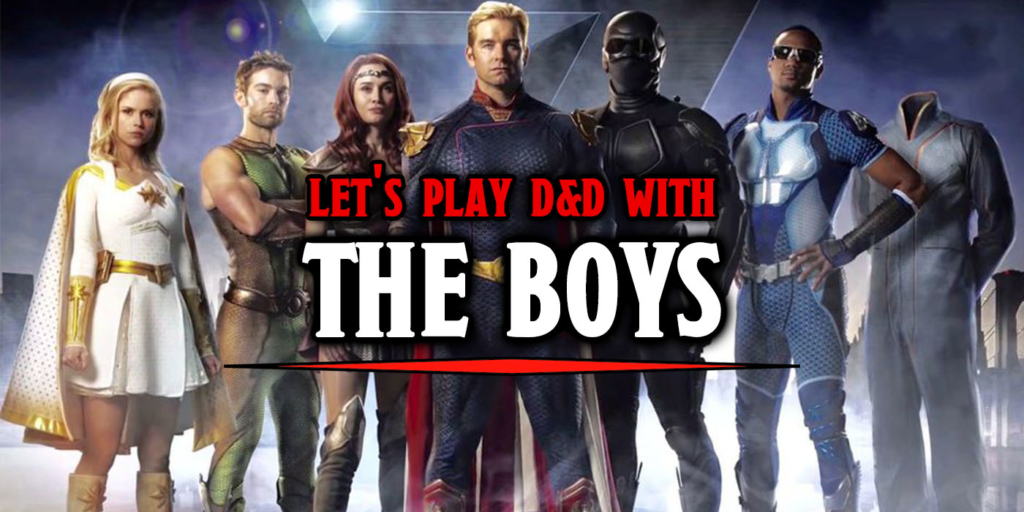D&D: Dungeons & Disabilities – The Community Responds To The Combat Wheelchair
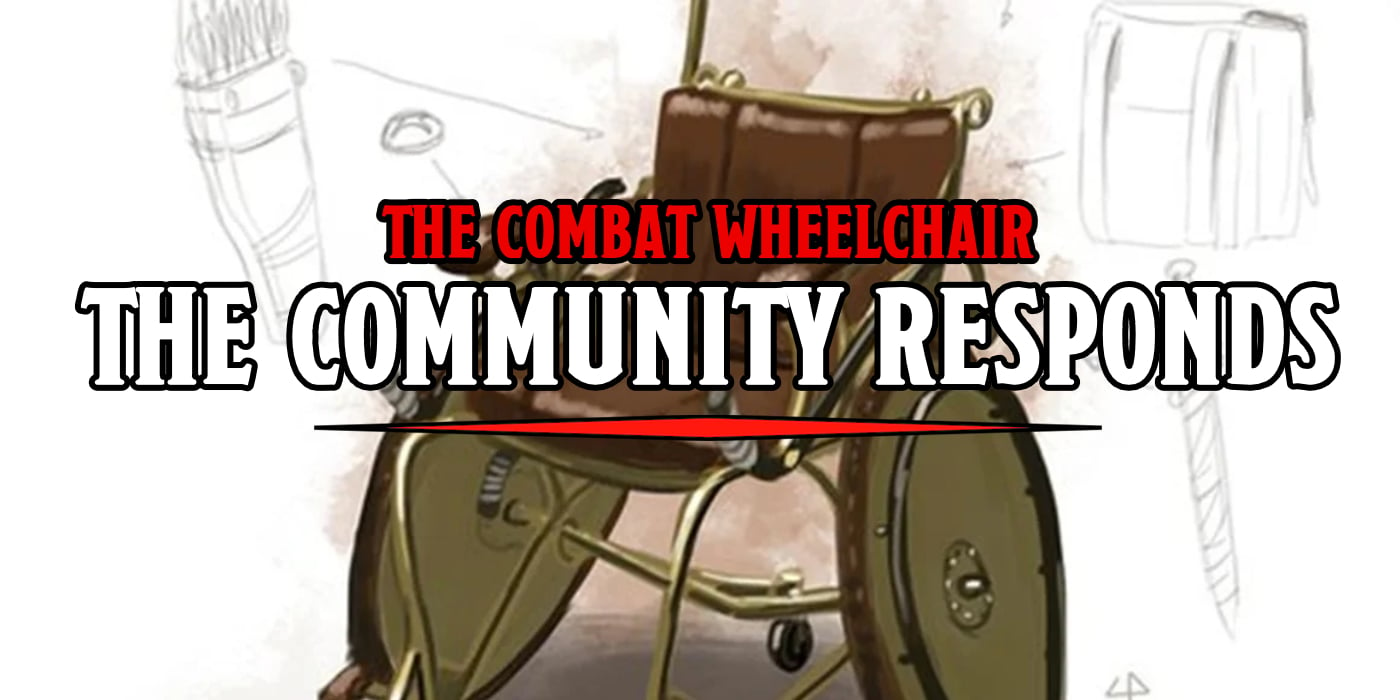

In light of the weeks of ongoing discussion and unfortunate harassment surrounding the Combat Wheelchair, a disabled DM speaks out.
The Combat Wheelchair has made waves in the tabletop world, raising a lot of support, but also vehement hatred from those opposed to it. Today we bring you some insights from a member of the community who is also disabled, offering up a viewpoint outside our own collective experiences at BoLS. The following piece, titled “Dungeons and Disabilities” comes from a guest columnist who is a DM with a disability, and one for whom the past few weeks of discussions, death threats, and harassment that have sprung up as the result of a homebrew item being offered for free, hits particularly close to home.
Though the views and experiences presented below are those of the author, BoLS supports work like Sarah Thompson’s, which advocates for more diverse representation in tabletop gaming, both on the table or behind the scenes.
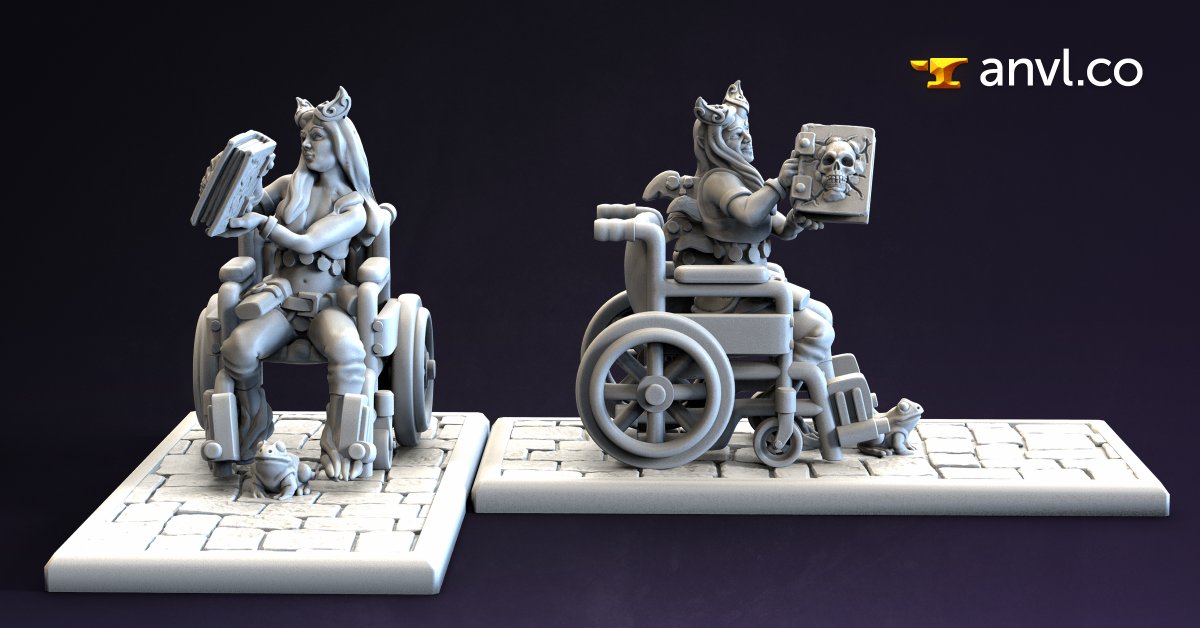
Illustrated: Tiefling on Wheelchair Mount from anvl.co
A guest column by Tiefyweefy
For days, and weeks I have debated putting down my thoughts about my experiences as not only a player with a disability, but a DM with a disability. For the longest time, I didn’t consider that prospective valuable. I didn’t think my experience as a player and Dungeon Master with a disability would have any real bearing on the culture of tabletop role-play, or the community at large. That mine was a small, far-off corner of my universe, in which I explored my disabled identity through a fantasy role-play.
After all, there tends to be this viewpoint in society that if you bring too much attention to what you’re doing, that you’re just doing it for that purpose – to attention seek or get validation. So, I kept my disability-centered role-play and game-running to myself and my friends and my role models, never really thinking that I would need to roll up for a larger discussion.
Boy, was I wrong.
A couple of weeks ago, Sarah Thompson dropped her homebrew item, the combat wheelchair. I watched this homebrew item, originally created for the sole purpose of allowing a person with a disability to have the option to role-play their disability or wheelchair use in their games of adventure, become an atom bomb to the rest of the tabletop community.
Suddenly, it’s not just an item made to represent disability or give an option to a specific demographic, because people all over the Internet started going after Sarah and her creation, saying that she was destroying the game by even asking people to accommodate this. Or they would continually take issue with the need for the wheelchair or its “fairness” compared to other items and abilities available to a first level character.
Worst of all, though, many of these people seem to take issue with disability itself–with the very idea that they would have to share the table with a party member who is differently abled. Let alone someone in need of a unique combat system or assistive device. There are comments that range from “I would just push the chair over,” to “I would dump them off a cliff.” And let’s not forget the even more troubling, “even if they wanted to play a character like that, I would force them to be healed as soon as possible.” Or this little gem, “With adventurers like that, who needs a hoard of goblins to stop them? Just put a flight of stairs in the way! Just put a pit in front of them!” All of these comments have a common denominator.
They are intolerant.
They are cruel, and they are fundamentally the very reason Sarah Thompson created the combat chair in the first place. Though I don’t think she anticipated what kind of war she would fight with it. That’s why I’m sharing my personal experience today. These comments—the unwelcoming and downright vicious reception of disability inclusion—needs to be spoken out against. It needs to be addressed directly, because these sorts of beliefs have no place in a role-playing game designed to tell a variety of stories, or uplift a variety of heroes.
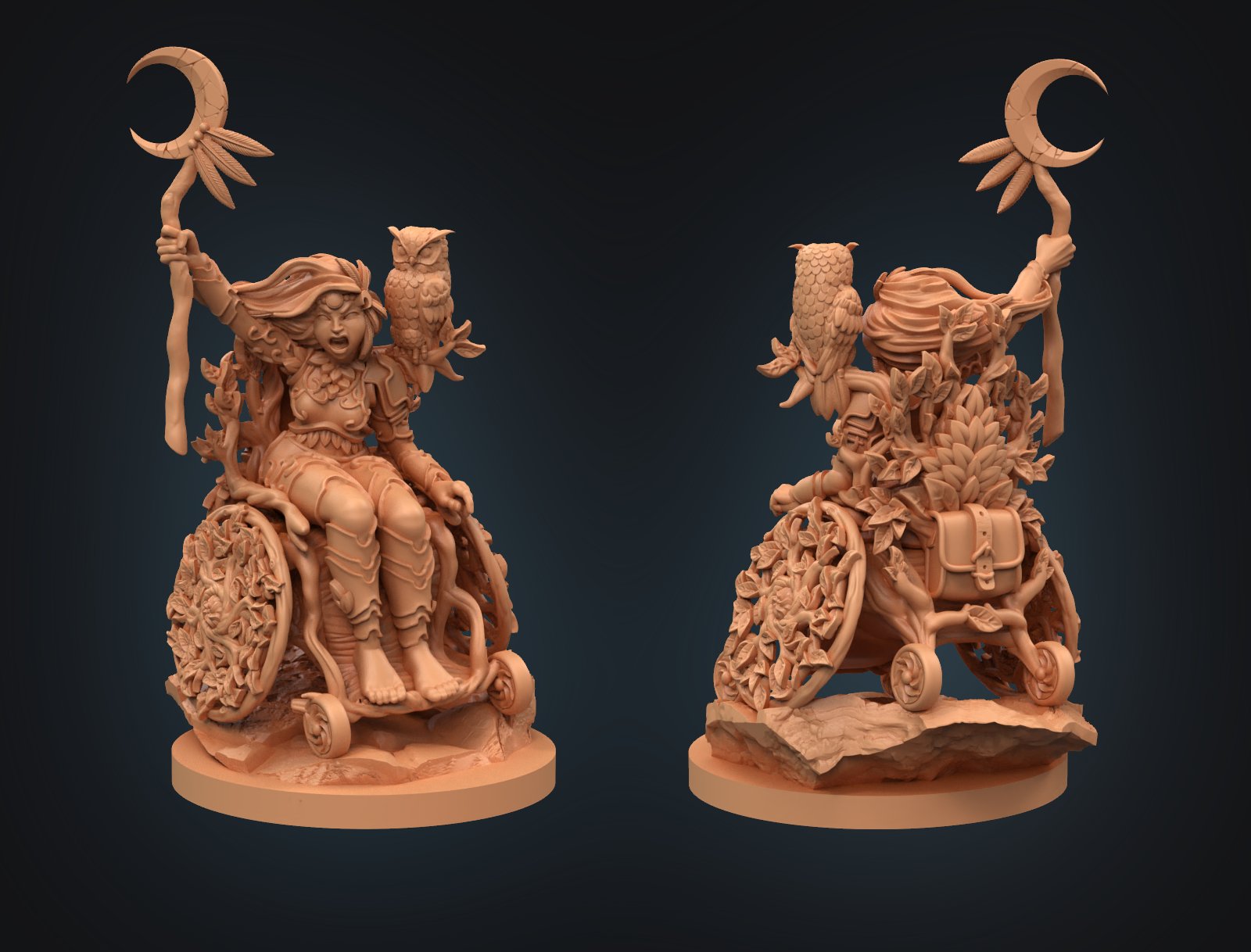
Illustrated: Human Druid Miniature from Strata Miniatures
When I started playing Dungeons & Dragons, I had never played a role-playing game in my life. I had never considered that I would even enjoy a game where I got to create a character and go on an adventure. Even being a writer and storyteller by trade, I wasn’t well-versed in the culture. In the world of stats, proficiency bonuses, tools, magic items, spells and the like.
But when I decided I was interested in playing, I decided that my first character was going to be a warlock. And that she was going to be built from the beginning to represent my disability. I went to the meet up where everyone was doing character creation, and I met with my DM. I was pleasantly surprised to see that he was also a wheelchair user, and might be “game” for my character concept. This was a relief, as earlier in the morning, I had been worrying about how this would go over with whomever was running the game, (because most players want advantages not disadvantages), but as I talked with him, he expressed admiration and interest in my choice to role-play a disability. Not exhaustion or unwillingness, which I had been prepared for.
From that moment on, the game partially became about him brilliantly solving how to move me around his world—in and through a dungeon—without negating my disability-centered role-play. It challenged him to ultimately come up with my version of the combat chair, before the combat chair: an infernal version of tenser’s floating disc, one that would be available for me to ride on and command as long as I was conscious, and as long as I did not get thrown or knocked from it. This had been devised by my Dungeon Master, not because my party members got irritated with my slower movement, or tired of me role-playing those aspects of my disability that were complicating, but because I needed some way to move in combat.
Over the course of the game, the DM had the patron go after my warlock, targeting her physical weaknesses which served to highlight my true strength: the strength of my spirit, the strength of my conviction to complete my quest, no matter my differences. No matter if my magical benefactor tried to twist it in on me. Make me dance on his puppet strings. It was a challenging dialogue that I proceeded to role-play through, but it was worth it. I got to watch myself and my party members grapple with story elements that, had I just chosen to play an able-bodied character, we wouldn’t have gotten to do. There would have been no reason to explore it. And even though my DM wasn’t able to finish this campaign (I ended up inheriting it from him and finishing just between myself and my partner), it left me feeling empowered.
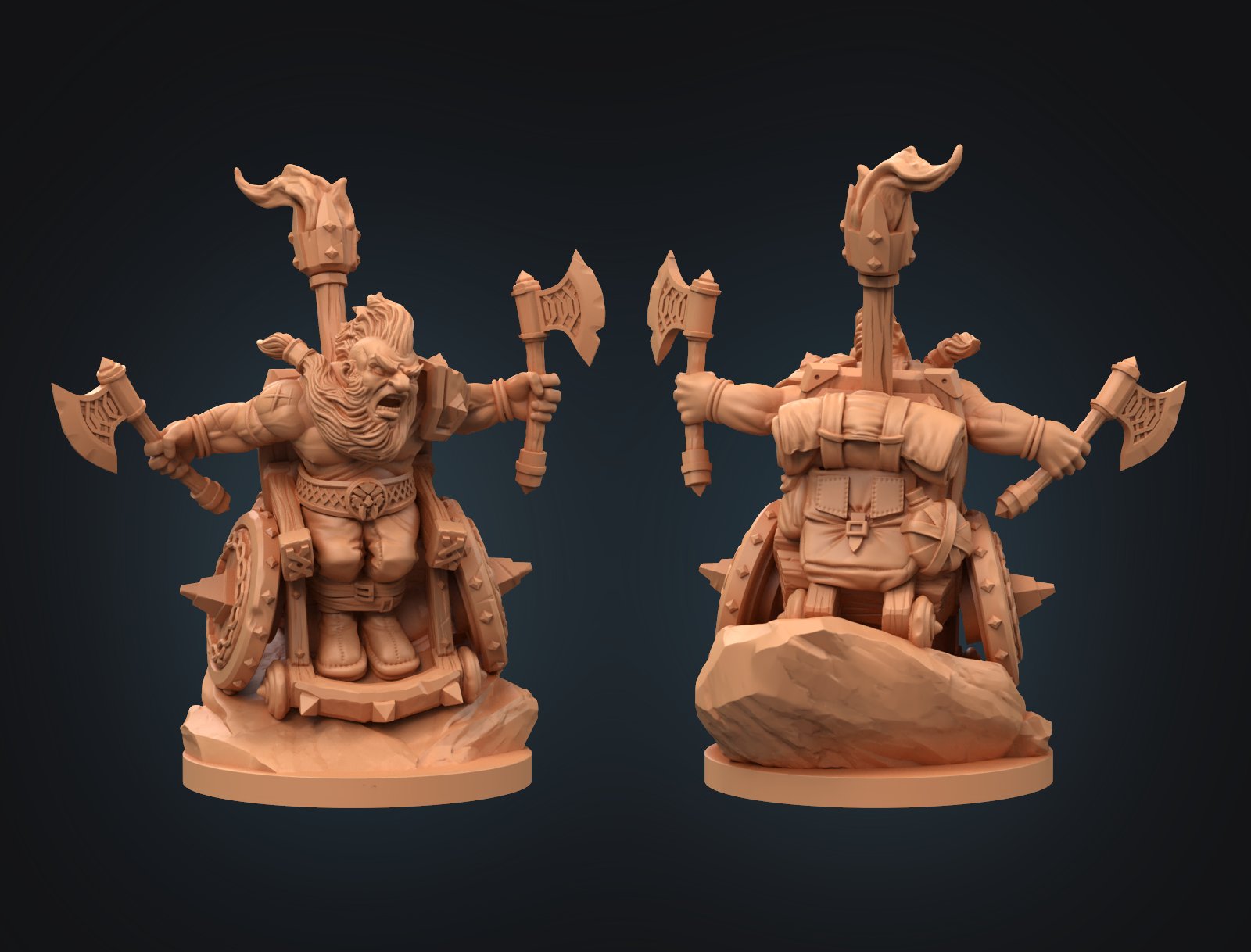
Illustrated: Dwarf Barbarian Miniature from Strata Miniatures
I started going to D&D meetings (when those were still thing) and hosting short games. At those meanings, I was the only other person (besides my original DM) with a disability working in that capacity. I was nervous. I was unsure if any players would want to play with me, because I was visibly in not like every other game master sitting around the tables. By chance or not, I started attracting other people with disabilities to my table for a game. Not all of them had physical disabilities, but each of them had their own challenge. Their own difference physically, emotionally, or mentally. And they somehow found their way around my table.
Even though at the time, I wasn’t focusing on disability representation, I was still providing a nonjudgmental, disability-friendly space by nature of my own circumstances. I provided an environment for my players to role-play however they wanted. For them to participate in the game without ever worrying that I might make them feel ostracized or ridiculed for the ways that their real-life disabilities came into play when role-playing their characters.
I have to admit that it makes feeling like being the “odd one out” as a player and DM worth it, because my players reflect back to me my value. That, even though I’m in a wheelchair most of the time, and sometimes my voice gets tight and stressed when I’m trying to describe something, or I have a muscle spasm in the middle of combat, that they enjoy my perspective. They enjoy not just the disability aspect that I may bring in if they want to play their characters that way, but my emotionality. My depth of feeling and character, where the focus is on not just what you can do, but who you are playing that character. It’s because of both of these experiences on either side of the DM screen that I’ve had a positive experience with my disability–in a way I could never have imagined before I got involved with D&D.
And I want this so badly for others. I want them to have the same kind of positive, naturally inclusive experience that I did. But when I see the kinds of things that have happened after the combat chair was released, I see a community who should be the most open-minded and welcoming of different people, showing itself to be the opposite.
This isn’t my tabletop community.
I’ve shared my story, not because I want to sit here in my wheelchair and be praised for being some sort of trailblazer, but because I think it’s necessary for people to understand how important this community is. And how much a positive, loving community has made me the strong, creative person I am today. It’s part of what has given me the courage to pursue more creative opportunities while looking for ways to bring disability representation and accessibility wherever I go.
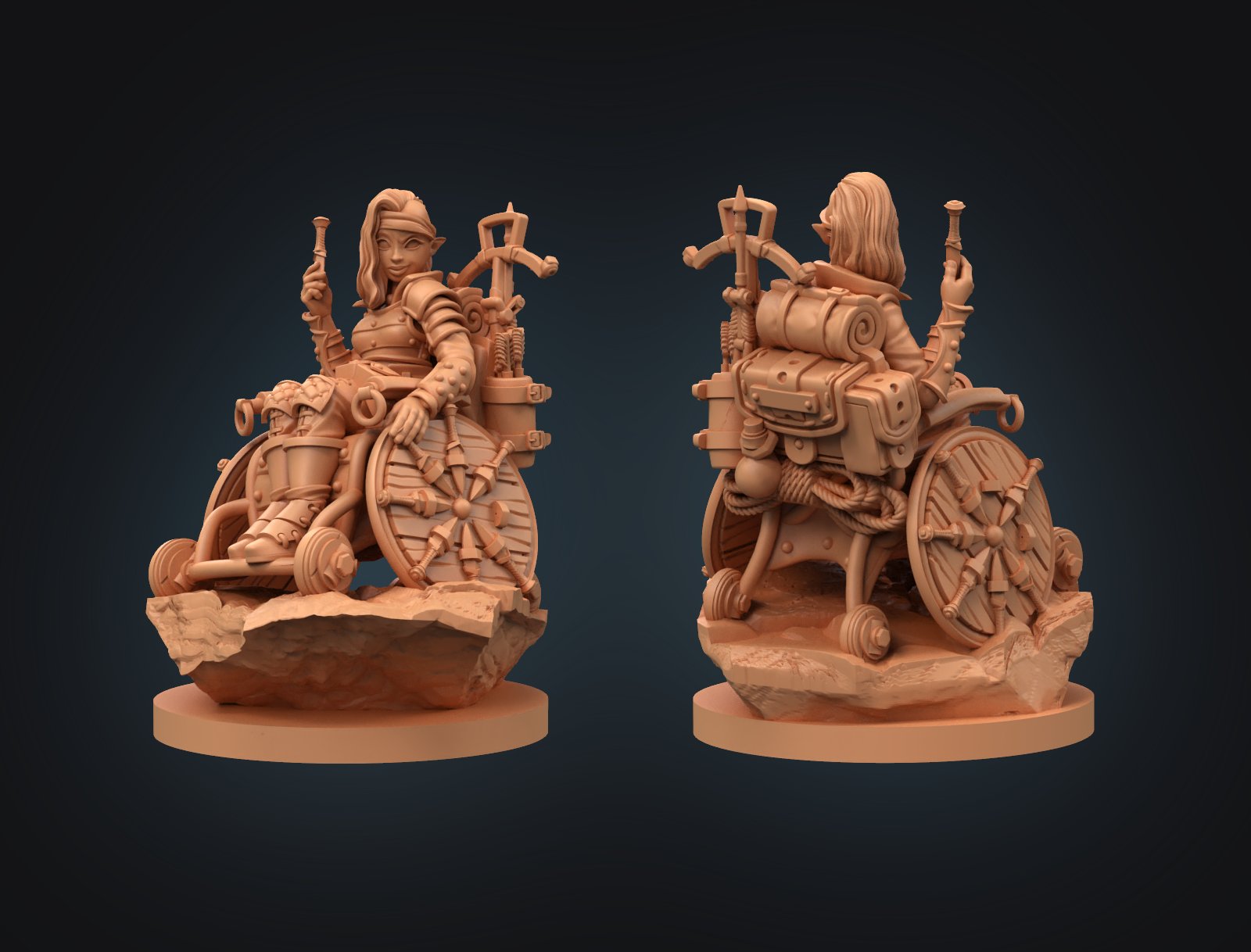
Illustrated: Elf Rogue Miniature from Strata Miniatures
I think it’s necessary for the community to understand just what it’s been like for players and Dungeon Masters like me. Especially with everything Sarah Thompson has been through. And over an optional rule. I think people need a reality check.
I think they need to realize that this invention of hers was only a matter of time. People like me were playing Dungeons & Dragons with disabilities before she brought it to a more public forum. People like me were coming up with solutions for how or how not to represent our disabilities in game if we wanted to do so. They may have been smaller in scale, but the need was still there. It was always there. It was just never embodied so visibly.
Or proudly.
So, don’t think that her combat chair is just some kind of stunt to get another inclusion notch in her belt. We have been looking for something like this, and she was just the one who had the courage to make something. She started a conversation, and I hope that my story underlines the importance of it.
And how unnecessary the negative reaction to her work has been.
She’s right.
Everyone deserves to be a hero, and everyone deserves a seat at that table, whether they roll, hover or walk there.
—
You can find more from the author, who goes by Tiefyweefy, on Twitter or YouTube.





